|
Books Should Be Free Loyal Books Free Public Domain Audiobooks & eBook Downloads |
|
|
Books Should Be Free Loyal Books Free Public Domain Audiobooks & eBook Downloads |
|
Non-fiction |
|---|
|
Book type:
Sort by:
View by:
|
By: Florence Converse (1871-1967) | |
|---|---|
 The Story of Wellesley
The Story of Wellesley
| |
By: Florence Daniel | |
|---|---|
 The Healthy Life Cook Book, 2d ed.
The Healthy Life Cook Book, 2d ed.
| |
By: Florence Hartley | |
|---|---|
 Ladies' Book of Etiquette, and Manual of Politeness
Ladies' Book of Etiquette, and Manual of Politeness
A guide for ladies, written in 1860, on what is accepted as correct behavior in polite society. The advice covers dress, travelling, staying in hotels, attending and giving parties and balls, making and receiving morning calls, letter writing, how to deal with servants, what accomplishments every well bred lady should be expected to acquire and how to choose a suitable husband. | |
By: Florence Kreisler Greenbaum | |
|---|---|
 The International Jewish Cook Book 1600 Recipes According to the Jewish Dietary Laws
The International Jewish Cook Book 1600 Recipes According to the Jewish Dietary Laws
| |
By: Florence Nightingale (1820-1910) | |
|---|---|
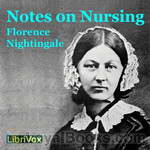 Notes on Nursing
Notes on Nursing
Notes on Nursing was published in 1859 and is a fascinating view into the theories underpinning the early development of modern nursing and public health reform by "the Lady with the Lamp", Florence Nightingale. Emphasising common sense and thought for the patient's care in many more ways than just administering physician-prescribed medicines, this is still a very relevant book for those interested in health or caring for the sick and infirm today.Summary by Cori Samuel. | |
By: Founding Fathers of the United States | |
|---|---|
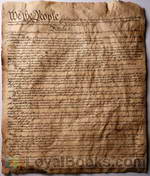 The Constitution of the United States of America, 1787
The Constitution of the United States of America, 1787
The Declaration of Independence was signed on July 4, 1776. It announced that the thirteen American colonies, who were at war with Great Britain in the American Revolutionary War, no longer considered themselves part of the British Empire. They now called themselves a new nation, The United States of America. This famous document went on to become a well-known keystone of the human rights movement. However, the newly formed state had no real identity or philosophy and were merely a loose collection of states that had freed themselves from colonial rule... | |
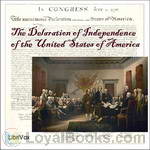 The Declaration of Independence of the United States of America
The Declaration of Independence of the United States of America
Declaration of Independence is the document in which the Thirteen Colonies declared themselves independent of the Kingdom of Great Britain and explained their justifications for doing so. It was ratified by the Continental Congress on July 4, 1776. | |
By: Frances Alice Forbes (1869-1936) | |
|---|---|
 Saint Athanasius: The Father of Orthodoxy
Saint Athanasius: The Father of Orthodoxy
A short and rather old fashioned biography a great saint. Don't expect subtlety; it's unapologetic hagiography. The saint is presented as a figure of pristine brilliance, courage and integrity and his persecutors as conniving villains. But to those who appreciate what was at stake in the controversy, Athanasius is indeed a God-sent hero. This is an informative, if quaint, introduction to a fascinating figure in history. | |
By: Frances Anne Kemble (1809-1893) | |
|---|---|
 Journal of A Residence On A Georgian Plantation, 1838-1839
Journal of A Residence On A Georgian Plantation, 1838-1839
Fanny Kemble was a British actress who married mega-plantation owner, Pierce Butler of Georgia. During her marriage she kept journals of everyday life, and after some years grew to detest the institution of slavery and the things Butler stood for. Kemble eventually divorced him, but it wasn't until after the Civil War had started that she published her journal about her observations and the experiences of the hundreds of African American slaves owned by her ex-husband. | |
By: Frances Calderón de la Barca (1804-1882) | |
|---|---|
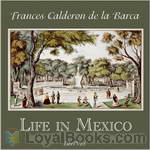 Life in Mexico
Life in Mexico
FRANCES CALDERON DE LA BARCA, born in Edinburgh, 1804, the daughter of William Inglis. After her father’s death she settled in America, where she married the Spanish diplomat, Don Angel Calderon de la Barca. She accompanied him on his various appointments to Mexico, Washington, and finally to Madrid, where she was created Marquesa de Calderon de la Barca by Alfonso XII and died in 1882. The present work is the result of observations made during a two years’ residence in Mexico, by a lady, whose position there made her intimately acquainted with its society, and opened to her the best sources of information in regard to whatever could interest an enlightened foreigner... | |
By: Frances M. A. Roe | |
|---|---|
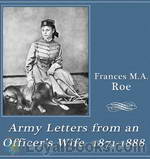 Army Letters from an Officer's Wife, 1871-1888
Army Letters from an Officer's Wife, 1871-1888
"There appeared from the bushes in front of me, and right in the path, two immense gray wolves . . . Rollo saw them and stopped instantly, giving deep sighs, preparing to snort, I knew . . . To give myself courage, I talked to the horse, slowly turning him around . . . when out of the bushes in front of us, there came a third wolf! The situation was not pleasant and without stopping to think, I said ‘Rollo, we must run him down - now do your best’ and taking a firm hold of the bridle, and bracing myself in the saddle, I struck the horse with my whip and gave an awful scream... | |
By: Francis B. (Francis Bail) Pearson (1853-) | |
|---|---|
 Reveries of a Schoolmaster
Reveries of a Schoolmaster
| |
 The Reconstructed School
The Reconstructed School
| |
 The Vitalized School
The Vitalized School
| |
By: Francis Bacon (1561-1626) | |
|---|---|
 The Essays of Francis Bacon
The Essays of Francis Bacon
Among the many ideas explored in this book are beauty, gardens, honor and reputation, cunning, nobility, friendship and many others. Authored by the man who is credited with having invented the essay form in English, The Essays of Francis Bacon was written over an extended period, ranging from the mid sixteenth century. They were compiled in a single edition in 1597 and later re-written, enlarged and added to in other editions in 1612 and 1625. However, their compelling and insightful quality still appears fresh and appealing to modern day readers... | |
 The New Atlantis
The New Atlantis
In 1623, Francis Bacon expressed his aspirations and ideas in New Atlantis. Released in 1627, this was his creation of an ideal land where people were kind, knowledgeable, and civic-minded. Part of this new land was his perfect college, a vision for our modern research universities. Islands he had visited may have served as models for his ideas. | |
By: Francis Ellingwood Abbot (1836-1903) | |
|---|---|
 A Public Appeal for Redress to the Corporation and Overseers of Harvard University Professor Royce's Libel
A Public Appeal for Redress to the Corporation and Overseers of Harvard University Professor Royce's Libel
| |
By: Francis Leggett | |
|---|---|
 Tea Leaves
Tea Leaves
| |
By: Francis P. Obrien | |
|---|---|
 The High School Failures A Study of the School Records of Pupils Failing in Academic or Commercial High School Subjects
The High School Failures A Study of the School Records of Pupils Failing in Academic or Commercial High School Subjects
| |
By: Francis Parkman | |
|---|---|
 Pioneers of France in the New World
Pioneers of France in the New World
Francis Parkman (1823-1893) has been hailed as one of America’s first great historians and as a master of narrative history. Numerous translations have spread the books around the world. The American writer and literary critic Edmund Wilson (1895-1972) in his book O Canada (1965), described Parkman’s France and England in North America in these terms: The clarity, the momentum and the color of the first volumes of Parkman’s narrative are among the most brilliant achievements of the writing of history as an art... | |
 The Jesuits in North America in the 17th Century
The Jesuits in North America in the 17th Century
Parkman has been hailed as one of America's first great historians and as a master of narrative history. Numerous translations have spread the books around the world. The American writer and literary critic Edmund Wilson (1895-1972) in his book "O Canada" (1965), described Parkman’s France and England in North America in these terms: "The clarity, the momentum and the color of the first volumes of Parkman’s narrative are among the most brilliant achievements of the writing of history as an art... | |
By: Francis Rolt-Wheeler | |
|---|---|
 The Boy With the U.S. Census
The Boy With the U.S. Census
THE BOY WITH THE U.S. CENSUSBY FRANCIS ROLT-WHEELERPREFACELife in America to-day is adventurous and thrilling to the core. Border warfare of the most primitive type still is waged in mountain fastnesses, the darkest pages in the annals of crime now are being written, piracy has but changed its scene of operations from the sea to the land, smugglers ply a busy trade, and from their factory prisons a hundred thousand children cry aloud for rescue. The flame of Crusade sweeps over the land and the call for volunteers is abroad... | |
By: Francis Wellman (1854-1942) | |
|---|---|
 Art of Cross-Examination
Art of Cross-Examination
A classic text on cross-examination of witnesses, including many examples of techniques used in celebrated cases by such notable attorneys as Abraham Lincoln and future Supreme Court Justice Benjamin Cardozo. Wellman sprinkles the text liberally with background facts and explanations of the cases and just plain gossip about the participants. Useful listening for anyone who occasionally feels the need to dig a bit deeper for the truth in any conversation. - Summary by Joanne Turner | |
By: François-René de Chateaubriand (1768-1848) | |
|---|---|
 Memoirs of Chateaubriand Volume IV
Memoirs of Chateaubriand Volume IV
After the extinction of Napoleon's comet on St Helena, Chateaubriand covers the Bourbon Restoration in this volume, meeting a dazzling array of literary and political figures, as his diplomatic career advances. - Summary by Nicole Lee | |
By: Frank Albert Waugh (1869-1943) | |
|---|---|
 Dwarf Fruit Trees
Dwarf Fruit Trees
This book is a handbook for the home orchardist. The propagation, pruning, choice of variety, and management of dwarf fruit trees, specifically apples, pears, peaches, and plums, are outlined. In addition, there is a section on berry bushes. It is geared towards gardeners in the United States of America and Canada. - Summary by A. Gramour | |
By: Frank Allaben (1867-1927) | |
|---|---|
 Concerning Genealogies
Concerning Genealogies
Written over a century ago, this comprehensive book offers insight into the methods used to research and compile a family history. As stated in the preface of the book, "Strong emphasis is laid upon the importance of employing the historical method..." which is sorely lacking in today's computerized compilations. - Summary by Roger Melin | |
By: Frank Bertram Wade (1875-) | |
|---|---|
 A Text-Book of Precious Stones for Jewelers and the Gem-Loving Public
A Text-Book of Precious Stones for Jewelers and the Gem-Loving Public
| |
By: Frank Harris | |
|---|---|
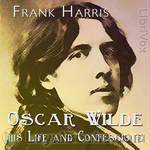 Oscar Wilde: His Life and Confessions
Oscar Wilde: His Life and Confessions
Consumers of biography are familiar with the division between memoirs of the living or recently dead written by those who “knew” the subject more or less intimately, and the more objective or scholarly accounts produced by later generations.In the case of Wilde, as presented to us by Frank Harris, we are in a way doubly estranged from the subject. We meet with Oscar the charismatic talker, whose tone of voice can never be reproduced – even if a more scrupulous biographer had set down his words accurately – and we are perhaps already aware of him as Wilde the self-destructive celebrity who uneasily fills the place of the premier gay icon and martyr in our contemporary view... | |
By: Frank Henderson | |
|---|---|
 Six Years in the Prisons of England
Six Years in the Prisons of England
A Merchant talks about daily life inside prisons of England, describes routines and how prisoners are treated. He notes stories of how fellow prisoners came to be in prison, and his ideas about the penal system, its downfalls and ways to improve it. The reader can see similarities to the problems we still have in regarding "criminals" today. (Introduction by Elaine Webb) | |
By: Frank Lewis Dyer and Thomas Commerford Martin | |
|---|---|
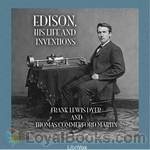 Edison, His Life and Inventions
Edison, His Life and Inventions
One of the most prolific and multi-talented geniuses the world has ever seen, Thomas Alva Edison's life is indeed an inspiration for each new generation. Today we live in a world that would not have been possible if not for several of his important inventions – the electric light bulb, the motion picture camera, electric power distribution, the phonograph, and a host of other things that we take for granted today. In fact, he still holds the world record for the maximum number of patents, numbering 1093 in all! Edison – His Life and Inventions by Frank Lewis Dyer and Thomas Commerford Martin, published in 1910 was in fact a biography commissioned by Edison himself... | |
By: Frank M. (Frank Morton) McMurry (1862-1936) | |
|---|---|
 How to Study and Teaching How to Study
How to Study and Teaching How to Study
| |
By: Franklin Allison Cresee | |
|---|---|
 Practical Pointers for Patentees
Practical Pointers for Patentees
| |
By: Franklin Beech | |
|---|---|
 The Dyeing of Cotton Fabrics A Practical Handbook for the Dyer and Student
The Dyeing of Cotton Fabrics A Practical Handbook for the Dyer and Student
| |
 The Dyeing of Woollen Fabrics
The Dyeing of Woollen Fabrics
| |
By: Franz Edelsheim (1868-) | |
|---|---|
 Operations Upon the Sea A Study
Operations Upon the Sea A Study
| |
By: Fred H. (Fred Herbert) Colvin (1867-1965) | |
|---|---|
 The Working of Steel Annealing, Heat Treating and Hardening of Carbon and Alloy Steel
The Working of Steel Annealing, Heat Treating and Hardening of Carbon and Alloy Steel
| |
By: Frederic Bastiat | |
|---|---|
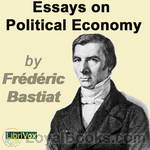 Essays on Political Economy
Essays on Political Economy
Bastiat asserted that the only purpose of government is to defend the right of an individual to life, liberty, and property. From this definition, Bastiat concluded that the law cannot defend life, liberty and property if it promotes socialist policies inherently opposed to these very things. In this way, he says, the law is perverted and turned against the thing it is supposed to defend. | |
By: Frédéric Bastiat | |
|---|---|
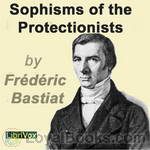 Sophisms of the Protectionists
Sophisms of the Protectionists
"To rob the public, it is necessary to deceive them," Bastiat said and believed. He reasoned, employing repetition to various applications, against fallacious arguments promoting the "Protection" of industries to the detriment of consumers and society. (Introduction by Katie Riley) | |
 Law
Law
"The law perverted! The law—and, in its wake, all the collective forces of the nation. The law, I say, not only diverted from its proper direction, but made to pursue one entirely contrary! The law becomes the tool of every kind of avarice, instead of being its check! The law guilty of that very inequity which it was its mission to punish! Truly, this is a serious fact, if it exists, and one to which I feel bound to call the attention of my fellow-citizens." —Frédéric Bastiat | |
By: Frederic DeWitt Wells (1874-1929) | |
|---|---|
 The Man in Court
The Man in Court
| |
By: Frederick A. Talbot (1880-?) | |
|---|---|
 Aeroplanes and Dirigibles of War
Aeroplanes and Dirigibles of War
"Aeroplanes and Dirigibles of War" is an interesting read of the beginnings of air warfare in World War I. Anyone interested in early aviation and armament will find this a fascinating work. By William Tomcho. | |
By: Frederick Adam Wright (1869-1946) | |
|---|---|
 Greek Athletics
Greek Athletics
The history of Greek athletics as it pertains to the Olympics. Describes various activities such as boxing, wrestling, etc. and accounts from witnesses, the Iliad, etc. as they pertain to famous Greeks and events. He discusses Greek views of physical appearance and fitness as they pertain to the games and society and also how and why individual city-states chose to participate in the Olympics. | |
By: Frederick Boyle (1841-?) | |
|---|---|
 About Orchids, a Chat
About Orchids, a Chat
This is not a manual of instruction for orchid growers; though there are many hints on cultivation, and a few paragraphs on how to hybridize. The author is just an enthusiastic amateur orchid lover. He takes the reader on a wander through the dangers and consequences of hunting orchids in the tropical jungles of the nineteenth century, and chats about the extreme peculiarities of orchid growth, behaviour and structure, colouring the essays with his own experiences and with his delight in cultivating these beautiful plants. Beware! A new hobby beckons! | |
By: Frederick Douglass (1818-1895) | |
|---|---|
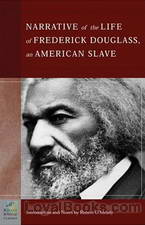 Narrative of the Life of Frederick Douglass
Narrative of the Life of Frederick Douglass
Frederick Douglass was born into slavery on a Maryland plantation. He faced hardship as a child, but later encountered owners who were relatively liberal and allowed him to learn to read, write and be in contact with freed slaves. At the age of 20, he escaped from the plantation and made his way to New York. Though he remained a fugitive, he married and changed his name to avoid being caught. He continued his education and became involved in the Abolitionist Movement. He began touring the country, speaking passionately about the unjust, cruel and inhuman practice of slavery... | |
By: Frederick G. Aflalo (1870-1918) | |
|---|---|
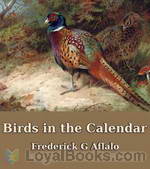 Birds in the Calendar
Birds in the Calendar
Delightful sketches of British wild birds – a bird for every month of the year from the pheasant in January to the robin in December. This collection of articles, reprinted in book form from the periodical The Outlook, is full of fascinating information about bird behaviour and habitat, as well as many interesting anecdotes. Out of date in some respects, particularly in its reference to the (now illegal) collecting of birds’ eggs, this book brings home forcefully how the populations of some British wild birds have declined since it was written. | |
By: Frederick Hugh Sykes (1877-1954) | |
|---|---|
 Aviation in Peace and War
Aviation in Peace and War
| |
By: Frederick Irving Anderson (1877-1947) | |
|---|---|
 Electricity for the farm Light, heat and power by inexpensive methods from the water wheel or farm engine
Electricity for the farm Light, heat and power by inexpensive methods from the water wheel or farm engine
| |
By: Frederick James Furnivall (1825-1910) | |
|---|---|
 Early English Meals and Manners
Early English Meals and Manners
| |
By: Frederick Whymper (1838-1901) | |
|---|---|
 Sea: Its Stirring Story of Adventure, Peril, & Heroism. Volume 1
Sea: Its Stirring Story of Adventure, Peril, & Heroism. Volume 1
Everything about the sea: history of ships, famous mariners and life on shipboard, adventure, shipwrecks and daring rescues. - Summary by Kikisaulite | |
By: Frederick Wilkinson | |
|---|---|
 The Story of the Cotton Plant
The Story of the Cotton Plant
| |
By: Friedrich Christian Accum (1769-1838) | |
|---|---|
 A Treatise on Adulterations of Food, and Culinary Poisons
A Treatise on Adulterations of Food, and Culinary Poisons
| |
By: Friedrich Engels (1820-1895) | |
|---|---|
 Condition of the Working-Class in England in 1844
Condition of the Working-Class in England in 1844
This is Engels' first book (since considered a classic account of England's working class in the industrial age), which argues that workers paid a heavy price for the industrial revolution that swept the country. Engels wrote the piece while staying in Manchester from 1842 to 1844, based on th bohis observations and several contemporary reports conducted over the period. | |
By: Friedrich Fröbel (1782-1852) | |
|---|---|
 Autobiography of Friedrich Froebel $c translated and annotated by Emilie Michaelis ... and H. Keatley Moore.
Autobiography of Friedrich Froebel $c translated and annotated by Emilie Michaelis ... and H. Keatley Moore.
| |
By: Friedrich Kerst | |
|---|---|
 Mozart, The Man and the Artist as Revealed in His Own Words
Mozart, The Man and the Artist as Revealed in His Own Words
Wolfgang Amadeus Mozart. His name is one of the most recognizable names in history and one of the most enduring of composers. At age 5, this “wunderkinder” took to the stage and began his life as a prolific and celebrated creator-genius of such luminous works the world has not known since. This collection of morsels taken from his personal letters is engaging and gives a look into the mind of the boy wonder. Was he mad? Was he miraculous? | |
By: Friedrich Nietzsche (1844-1900) | |
|---|---|
 Beyond Good and Evil
Beyond Good and Evil
Beyond Good and Evil, by Friedrich Nietzsche A searing indictment of concepts like “truth” and “language” Beyond Good and Evil, by Friedrich Nietzsche is a deeply thought provoking book that forms one of the keystones of modern thought and politics. In this book, Nietzsche takes the position that our subservience to fixed perspectives that are forced on us by our language and our ideals make us incapable of perceiving reality. He propounds the theory that ideals are not fixed but change over time, often dramatically, and end up becoming the exact opposite of what they originally were... | |
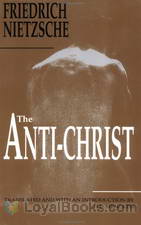 The Antichrist
The Antichrist
Save for his raucous, rhapsodical autobiography, Ecce Homo, The Antichrist is the last thing that Nietzsche ever wrote, and so it may be accepted as a statement of some of his most salient ideas in their final form. Of all Nietzsche’s books, The Antichrist comes nearest to conventionality in form. It presents a connected argument with very few interludes, and has a beginning, a middle and an end. | |
By: Friedrich Schiller | |
|---|---|
 The Thirty Years War
The Thirty Years War
The History of the Thirty Years War is a five volume work, which followed his very successful History of the Revolt of the Netherlands. Written for a wider audience than Revolt, it is a vivid history, colored by Schiller’s own interest in the question of human freedom and his rationalist optimism. Volume 1 covers the background of the war, through the Battle of Prague in late 1620. (Introduction by Alan Winterrowd) | |
By: Friedrich Wieck (1785-1873) | |
|---|---|
 Piano and Song
Piano and Song
This book talks about teaching, learning and performing on the piano in a delightful style, alternating between conversation and instruction. As he was the father of Clara Schumann and Robert Schumann's teacher, need I say more? | |
By: Fritz Kreisler | |
|---|---|
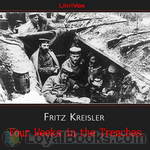 Four Weeks in the Trenches
Four Weeks in the Trenches
A brief record of the fighting on the Eastern front in the great war by a participant in that great and terrible conflict | |